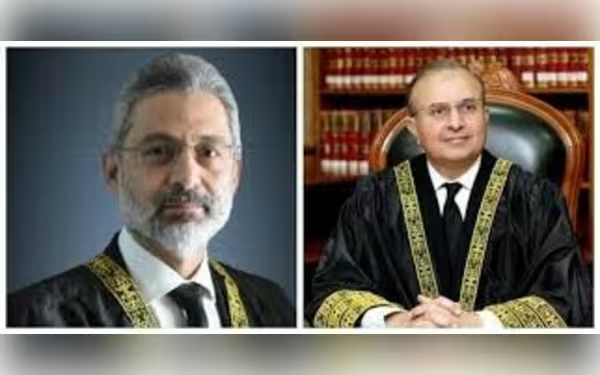Saturday, November 16, 2024 08:48 PM
Justice Shah Raises Concerns Over Supreme Court Procedure Changes
- Justice Shah questions restructuring of SC Practice and Procedure Committee.
- Criticism of undemocratic practices in committee operations.
- Concerns over judicial independence and transparency in legal framework.
 Image Credits: brecorder
Image Credits: brecorderJustice Shah questions changes to Supreme Court's practice laws, raising concerns over transparency and judicial independence.
The legal landscape in Pakistan is currently witnessing significant changes, particularly concerning the Supreme Court's practice and procedure laws. Recently, Justice Mansoor Ali Shah, a prominent judge of the Supreme Court, expressed his concerns regarding the restructuring of the SC Practice and Procedure Committee. His remarks have sparked discussions about the implications of these changes on the judicial process.
On Monday, Justice Shah communicated with the SC Practice and Procedure Committee, stating that he would refrain from participating in its activities until a thorough review of the full court ordinance is conducted. He emphasized that the previous committee could have continued its operations even after the ordinance was issued, suggesting that the immediate restructuring was unnecessary. Justice Shah criticized the inclusion of a preferred member in the committee, labeling it as undemocratic and akin to an "one-man show." This statement raises questions about the fairness and transparency of the committee's operations.
Moreover, Justice Shah pointed out the "lack of explanation" surrounding the removal of Justice Munib Akhtar from the committee. His absence from the judges' committee meeting in Islamabad led to an early adjournment of the session, which was the first gathering following the federal government's promulgation of the ordinance aimed at amending the Supreme Court (Practice and Procedure) Act 2023.
Chief Justice Qazi Faez Isa was set to preside over the meeting, which was crucial for determining the formation of benches for upcoming cases. In a notable development, Chief Justice Isa nominated Justice Aminuddin Khan, who ranks fourth in seniority among Supreme Court judges, as the third member of the newly constituted committee under the SC Practice and Procedure Act, 2023.
Last week, the federal government enacted the Supreme Court (Practice and Procedure) Amendment Ordinance, 2024, which introduced several changes to the existing Act. Notably, the ordinance alters the composition of the three-member judges’ committee responsible for deciding on the formation of SC benches and cases related to human rights. Previously, the committee consisted of the chief justice and the two senior-most judges of the Supreme Court. However, the new ordinance grants the chief justice the authority to nominate one member of the committee at any time.
A notification from the Registrar’s Office of the Supreme Court confirmed that Justice Mansoor Ali Shah is also a member of this three-member committee. Sources indicate that the judges’ committee is expected to convene again on Monday, September 23, to further discuss these pressing matters.
The ongoing changes to the Supreme Court's practice and procedure laws raise important questions about the future of judicial independence and the democratic process within Pakistan's legal framework. As these developments unfold, it is crucial for stakeholders, including legal experts and the public, to remain informed and engaged in discussions about the implications of these changes on the justice system. The integrity of the judiciary is paramount, and ensuring transparency and fairness in its operations will be vital for maintaining public trust.













